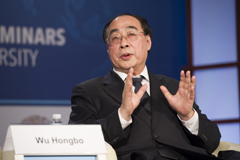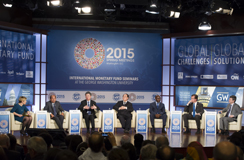What will be the way forward for financing for development and what can the international community expect from the upcoming Third International Conference on Financing for Development taking place in Ethiopia in July? These and other questions related to financing for development were discussed by UN DESA’s Under-Secretary-General Mr. Wu Hongbo and other panellists at the IMF seminar “Financing for Development: The Way Forward” on 17 April.
2015 is a critical year for international development and for sustainable development in particular. The global community will come together to adopt a new set of Sustainable Development Goals (SDGs) and it will also agree on a financing framework for sustainable development and for the implementation of these new goals.
Held as part of the 2015 Spring Meetings of the World Bank and the IMF, and moderated by US Managing Editor and Financial Times columnist Gillian Tett, the seminar discussed key questions related to financing the new development agenda and the role of governments, international organizations, private sector and donors in this context.
“I agree–it’s not easy to remember 169 targets and 17 goals. But the Millennium Development Goals (MDGs) were very focused on reducing poverty, whereas the SDGs go way beyond that, covering much broader issues related to sustainable growth and prosperity,” said IMF Deputy Managing Director Min Zhu.

Mr. Wu, who leads the work preparing for the International Conference in Addis Ababa in July, said the new development agenda will cover all Member States—rich and poor, developing and developed, for the next 15 years. He also stressed the need for vast financial resources to realize these new goals and pointed to their necessity for the wellbeing of everyone inhabiting this world. “We need everybody on this planet to have a target in their mind, governments in particular. We work for the whole world, for our future generations,” he said.
The World Bank’s Chief Financial Officer, Betrand Badré, said the cost of implementing the SDGs would likely be in the trillions, whereas the current Official Development Assistance program runs in the billions of dollars. But Badré also pointed out that there may be an opportunity in the private sector, where there are trillions of dollars looking for yield.
 Jeffrey Sachs, Director of the Earth Institute, agreed that private capital could do a lot towards financing the SDGs, and suggested they reach out to the world’s wealthiest, who have the means to co-finance the venture.
Jeffrey Sachs, Director of the Earth Institute, agreed that private capital could do a lot towards financing the SDGs, and suggested they reach out to the world’s wealthiest, who have the means to co-finance the venture.
“We have 1,826 Billionaires that have a net worth of $7.1 trillion. Trillion! Since I’m at a University I think in terms of endowments. If they were to endow the SDGs with their net worth, a 5 percent payout ratio would be $355 billion a year. That’s almost three times what governments give in all aid!”
Sufian Ahmed Beker, Minister of Finance and Economic Development of Ethiopia and Florencio Barsana Abad, Budget and Management Secretary for the Philippine Government also shared their views on the way forward for financing the new sustainable development agenda, benefitting people and planet.
Video and photo coverage courtesy of IMF
